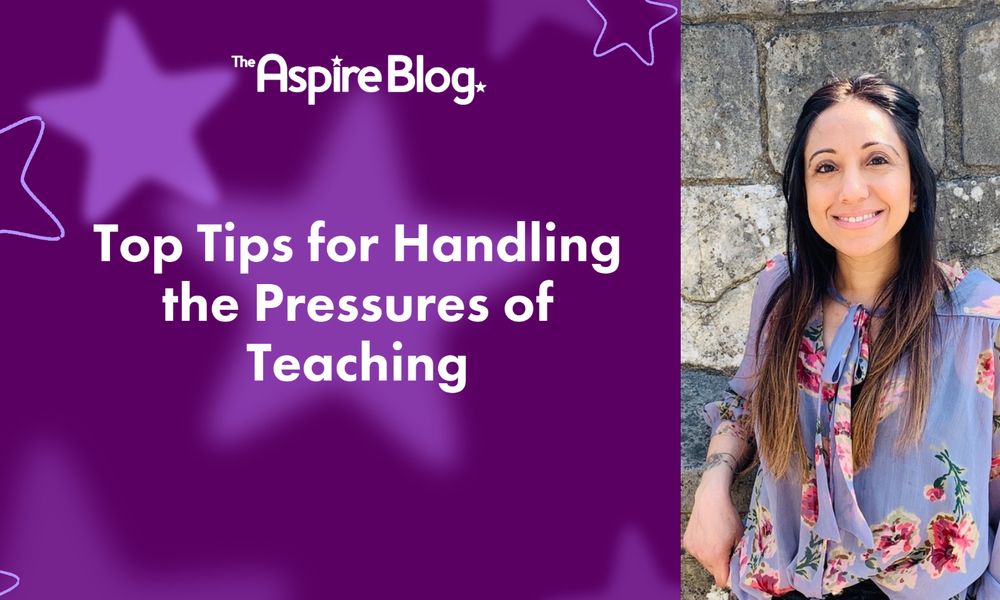Top Tips for Handling the Pressures of Teaching
Published date: 2020/10

At Aspire People we have been working with Suneta Bagri an award-winning coach, speaker, and well-being coach with over 20 years of experience in the education sector. Suneta is keen to help and support as many people as possible, so below she has offered some tips and shared some experiences to help others.
Top Tips for Handling the Pressures of Teaching
The classroom can be a nerve-wracking place, whether you’re a newly qualified teacher starting your career in education or an experienced teacher that has years of experience behind them. Teaching can be extremely rewarding, but it can also be very stressful, and how you handle that pressure can be all the difference between being happy at work or being demoralised.
Numerous surveys have found out that 76% of the teaching staff described their mental health as ‘poor’ or ‘very poor,’ and most of them blamed this on their workload and the stress that it causes. So, being able to handle the pressure of the classroom is key to both managing your own mental health and allowing you to enjoy your time teaching. We have decided to share our top tips to help you get on top of the pressures of teaching.
1. Spend Time With Your Colleagues
The staff room is a great place to relax with other teachers during break times and after school hours. You’re most likely to form some strong friendships with different colleagues and be a part of a support network that can help you through some of the tougher times.
You should make the most of this time and bounce ideas off your colleagues. Share your problems, and sometimes talking things through with like-minded individuals who are facing similar pressures will help you see things in a more positive light.
2. Switch Off and Relax
Everyone needs a break, so ensure that you take some time for yourself once your working day is over. It could be as simple as enjoying a cup of coffee, reading your favourite book, or listening to some great music. Whatever appeals to you, go ahead and do it, as it’s important to enjoy the moment and relax.
You should also switch off your phone, power down your computer, and ignore the emails. You’re not paid to be on call 24 hours a day, so you don’t need to answer that email late at night when you’re in bed.
3. Communication Is Key
If you’re feeling overloaded or stressed at work, holding regular meetings with colleagues, line managers, and mentors can help reduce pressure. Good communication can help you get the support you need to plan your work accordingly. Communicating well is also going to help you build relationships with your team, and that itself can help relieve the pressure of the classroom.
4. Exercise and More Exercise
Exercise is one of the most effective ways to relieve tension as it not only improves physical fitness but also has a calming and positive effect on the mind. You can take a run, go for a bike ride, go for a swim, or take an exercise class to get your mind off things. You can even pull up your running shoes and jog home from school if you’re feeling up to the challenge.
The education profession is overstretched and under increasingly intense pressure. More than half of Britain's teachers have a diagnosed mental health problem, according to a study by Leeds Beckett University. Pressures at work - coupled with mounting needs to care for students’ mental health means many, many teachers forego their own. How can this be good for anyone?
Suneta Bagri and Steve Waters
Suneta Bagri and Steve Waters are well-being Consultants who specialise in workplace well-being within schools and education.
Suneta is a former Headteacher, with a career spanning over 20 years in Primary schools, as a teacher, SENDCo and senior leader. She is a Fellow of the Chartered College of Teaching. Suneta is an accredited (and award-winning) coach. She supports the well-being and mental health of teachers, school leaders, both individually and within the school context. She has a number of projects that develop emotional literacy for children through workshops, coaching, and mindfulness sessions. Suneta has bereavement counselling qualifications and is a First Aid for Mental Health Instructor, a Health & Well-being Champion as well as a licensed and accredited Teacher of Mindfulness. She is director of Cultivate Coaching & Consultancy and founder of the Every Teacher Matters Project.
Steve has over 40 years’ experience in secondary education, including as Head of Drama, Head of English, Assistant Principal and a local authority consultant with a School Improvement team. He is a Founding Fellow of the Chartered College and an elected member of council. Steve is also a qualified Counsellor (BAC) and is a First Aid for Mental Health Instructor, accredited by NUCO through the Awarding Body First Aid Awards (FAA). As Founder and CEO of the Teach Well Alliance, Steve works in partnership with schools to implement a culture of staff wellbeing and mental health through his unique programme, the Teach Well Toolkit.
